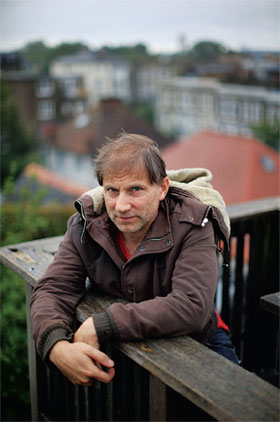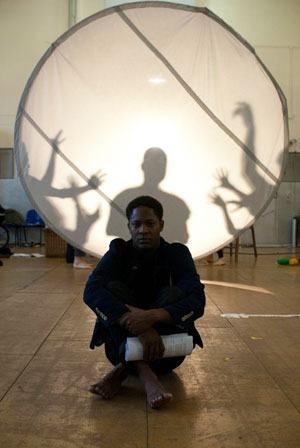Interview: the founders of Complicité
Roula Khalaf, Editor of the FT, selects her favourite stories in this weekly newsletter.
It’s 1983. Four friends have just pooled their dole money and bought an old yellow Post Office van for £350. They carpet the boot and load up their props to tour their first show – made in a scout hut in Cambridge – playing for little more than petrol money.

Three decades on, the same theatre company – Complicite – has headlined the Avignon International Festival, arguably the most prestigious accolade in European theatre, with an adaptation of Bulgakov’s The Master and Margarita. It has won a Perrier Award, several Oliviers – most recently for A Disappearing Number in 2008 – and an almighty global reputation. Not bad for what founder member Annabel Arden says “was supposed to be a one-summer gig”. It is even on the A-level syllabus. “Oops,” she says. “How did that happen?”
The answer, in part, is Simon McBurney, Complicite’s artistic director and its one constant presence over 30 years. He doesn’t see it quite like that, dubbing himself “a cipher” and rattling off a long list of collaborators: co-founders Arden, Marcello Magni and Fiona Gordon, as well as various writers, designers, composers and performers. “I’m utterly dependent on other people,” he says.
McBurney, now 55, is philosophical about the company’s anniversary – and indeed about everything else. His answers are whirling, circuitous monologues, crammed with abstract ideas. Any autobiography, he says, focusing intently on the butternut squash salad in front of him at an artisan café off London’s Tottenham Court Road, “is just a story. Our lives are a sequence of things. When we’re alive, they’re continuing, just as my words now are an improvisation. So the idea of 30 years is actually quite nebulous. It’s impossible to encapsulate it. All you can do is go: what next?”
As such, there’s no great fanfare to mark the occasion. There’s a private celebration planned for autumn, but otherwise it’s business as usual. A revival of 2009’s Shun-Kin will tour internationally, and McBurney will have his second shot at opera in November with The Magic Flute at English National Opera, while continuing work on a new show, Amazon Beaming, about human consciousness and anthropological research, two of his pet fascinations.
This year will, however, see Arden’s return to the company after 14 years to direct Complicite’s first children’s show. It’s an adaptation of the Lionboy novels by Arden’s schoolfriend Louisa Young, who writes with her daughter as “Zizou Corder”. The books follow Charlie Ashanti, a boy who can speak to cats, as he evades the corrupt pharmaceutical company that has abducted his scientist parents.
Actually, says Arden, Complicite did once make a kids’ show, but it’s not in the official records. In 1986, Joseph Seelig, now artistic director of the London International Mime Festival, invited them to the Hong Kong Children’s Festival. “It didn’t even have a name,” she recalls. “Joe rang us and said, ‘Have you got a kids’ show?’ He named the fee; much larger than anything we’d ever had. I said, ‘Sure we’ve got a kids’ show.’ We spent a frantic week scrambling together some ridiculous jokes and arrived in Hong Kong with a suitcase full of balloons, red noses and half an hour of nonsense.”
Lionboy’s narrative is more complex – Arden admires its refusal to pander or patronise – but it will be simply told on-stage. “There are no tricks, no technology. It’s very, very important that children feel they can tell stories physically and verbally, because they’re invited to use technology so young. If I say I’m a lion, I’m a lion.”

That’s trademark Complicite. Everything hinges on imagination. In past shows, books have fluttered into flocks of birds and chairs have stood in for people. “It’s nothing to do with it being a clever trick,” McBurney says. “Theatre is about the collective imagination …Everything I use on-stage is driven by the subject matter and what you might call the text – but that text can be anything, from a fragment of movement or music to something you see on a TV.”
This philosophy comes from Paris’s Ecole Jacques Lecoq, where Complicite’s four founders met. The Lecoq school emphasises physical theatre and clowning. “You become aware that theatre is not just the Royal Shakespeare Company,” Arden says, citing choreographer Pina Bausch, artist/set designer/director Tadeusz Kantor and Japanese theatre as early influences.
Although it has staged plays and “impossible adaptations”, Complicite began by using text as a leaping-off point, rather than a script. “People talked about our early work as style over content,” McBurney recalls, “but that was partly because they couldn’t read it. They didn’t get the idea that a gesture could be articulate. People are more visually literate and open to suggestion nowadays.”
Complicite can take some credit for that. McBurney and Co. set out to change things and he views its inception as “an act of resistance …There was a feeling of being in opposition to the orthodoxy proposed by the government and in opposition to the theatrical orthodoxy.”
Initially, Complicite performed wherever and whenever possible: in prisons, in miners’ clubs, in schools, in public. “If you’re an actor, go out and act,” says McBurney. They suffered bruises from concrete and were, on occasion, attacked mid-show or stopped by police. “If I ever had a drama school – God forbid – I’d make people go on the streets. If you can hold people’s attention there, theatre is a piece of piss.”
Since 1999 and the seminal Mnemonic, which connected a daughter searching for her father with a 5,000-year-old corpse found preserved in the Alpine ice, the company’s work has grown increasingly reliant on technology, particularly video-projection. However, the spirit of conjury remains, as does the slippery subject matter. “Our desire was always to articulate things on the edges of experience,” McBurney says. “Any play that’s making a point is less interesting than something that stays with you and suggests something further.”
You leave a Complicite show with a headful of blurry profundities. Key motifs of memory, history and mortality swim beneath the surface. “Simon’s father was an archaeologist,” notes Arden, “so he’s fascinated by digging, going back and back, deeper and deeper.”
While he recognises his father’s influence – the second show, A Minute Too Late, was a response to his death, which recurs in Mnemonic – McBurney says he sees things slightly differently: “My brother calls me ‘constitutionally disobedient’, but I would suggest that I’m insatiably curious. I just want to know. That’s also why 30 years feels so incredibly inappropriate to me. I feel as if I’ve only just begun. Everything’s to do. I want to say, ‘Wait, wait, wait. That was just the prologue.’”
‘Lionboy’ opens at Bristol’s Old Vic on May 29, then tours until July 21, www.bristololdvic.org.uk
Comments